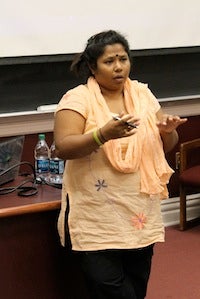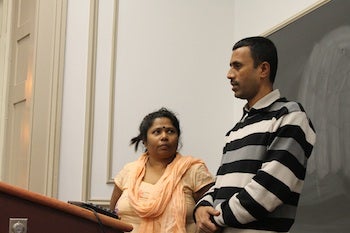KI Hosts Discussion with Labor Leaders from Bangladesh
Posted in Events
On September 20, 2012, the Kalmanovitz Initiative hosted a discussion with Kalpona Akter and Babul Akhter, leaders of the Bangladesh Center for Worker Solidarity. The event was co-sponsored by the Workers Rights Consortium and the International Labor Rights Forum.
 Kalpona Akter spoke about her own experience working in a garment factory from the age of twelve. At that time, she earned a wage of $3/month and worked for as many as 23 days in a row. At age twenty, she attempted to organize the workers in her factory into a union—and was promptly fired.
Kalpona Akter spoke about her own experience working in a garment factory from the age of twelve. At that time, she earned a wage of $3/month and worked for as many as 23 days in a row. At age twenty, she attempted to organize the workers in her factory into a union—and was promptly fired.
Today, 23 years later, garment workers in Bangladesh earn $38/month. But due to inflation, this translates to less than the $3/month that Akter earned as a child. Bangladesh pays the lowest wage of any garment-producing country, but they are now second only to China in the volume of apparel they supply to U.S. retailers.
She reported that workers still suffer from physical and verbal abuse, and they regularly face health and safety hazards in the factories they work in. In the past seven years, over 400 workers have been killed in factory fires. There have been repeated reports that locked gates prevented workers from escaping from fires, and as a result, workers jumped out of windows and to their deaths.
As Akter noted, events like the infamous Triangle Shirtwaist Factory fire that happened in New York in 1911 are still happening in Bangladesh today.
Akter and Akhter were arrested in 2010 under charges of fomenting unrest, despite the inability of government security forces to produce evidence against them. Akter described how she was interrogated for 18 hours straight, an experience that has left a lasting impact on her.
 Babul Akhter also spoke about his time in prison—of a day when he was blindfolded, handcuffed and taken to a room to be beaten, without a word spoken about why they had brought him there. Akhter described the fear he felt that he would not come back, and how before he was taken to the room, he left the phone numbers of family members with other prisoners in the hopes that they would be able to get out the truth about what happened to him.
Babul Akhter also spoke about his time in prison—of a day when he was blindfolded, handcuffed and taken to a room to be beaten, without a word spoken about why they had brought him there. Akhter described the fear he felt that he would not come back, and how before he was taken to the room, he left the phone numbers of family members with other prisoners in the hopes that they would be able to get out the truth about what happened to him.
With the help of international allies, Akter and Akhter were released on bail, but their criminal charges are still pending. If convicted, Akter could be imprisoned for the rest of her life.
But most strikingly, Akter spoke about the death of their colleague Aminul Islam, who was found tortured and murdered in April 2012. There has still been no resolution to his murder investigation, and his allies in Bangladesh are still seeking justice for his death.
Akter asked, if this can happen to an organizer, then what about the workers? What do they have to face?
Change, she said, must happen on the consumer side. Consumers in the United States and other countries must make their voices heard in order to convince retailers to pressure factory owners into improving working conditions in Bangladesh. The interests of factory owners and the Bangladeshi government are so intertwined that international pressure is vital. She encouraged attendees not to boycott apparel made in Bangladesh—since in all honesty, the alternatives are no better—but to instead write and speak out and spread their story, so that American retailers will be pressured into improving conditions in the factories that produce their products.
She said, “Buyers are the most powerful key.” She urged the students in attendance to hold their brands accountable. Those in attendance were clearly moved by what they heard.
